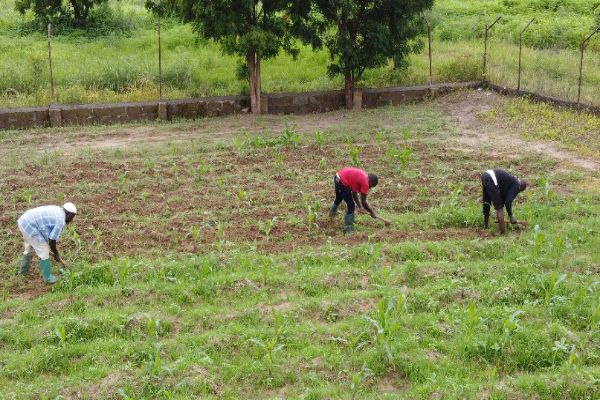The Federal Government (FG) and farmers, particularly in the South-West, have been praised for the recent reduction in food commodity prices nationwide. However, while consumers benefit, many farmers say they are bearing the cost.
In a Monday survey across Oyo, Ogun, and Kwara States, reporters found calls for stronger collaboration to ensure that all stakeholders benefit.
Mr. Adewumi Abas, South-West Coordinator of the All Farmers Association of Nigeria (AFAN) and Oyo State Chairman, appreciated the FG’s importation policy, noting that it has helped make food more affordable.
“The President Bola Tinubu-led administration allowed importation to ease the burden on the people. The result is reflected in the current food prices,” he said.
Abas also commended farmers for cooperating with government policies, contributing to the reduction in prices. He acknowledged, however, that farmers still struggle with rising costs of farm inputs. He appealed to AFAN members not to hoard produce and urged the government to support them with affordable inputs, security, and irrigation facilities to enable year-round farming.
Abas added that farmers in the South-West have attended training on produce storage and processing to reduce post-harvest losses. “Some farmers are now processing farm produce and practicing value addition, especially with yams, cassava, and perishable foods,” he said.
He also highlighted government efforts to purchase surplus food into strategic grain reserves. “Garri is currently being mopped up nationwide because of surplus cassava during the harvest,” he noted.
Mr. Adetunji Samson, Oyo State Coordinator of the Federal Ministry of Agriculture and Food Security, attributed the price reduction to government interventions, including improved security, training, and farmers’ empowerment through modern technology. He said interventions by Minister Abubakar Kyari, such as subsidized inputs and processing equipment, have lowered production costs and market prices.
However, some farmers argue that the price reductions have come at their expense. Elder David Adeoye, an Ibadan-based farmer, said many are struggling due to high production costs. “Prices of fertilizers and chemicals remain high, while the government forces down market prices. Many farmers may abandon farming next season,” he warned, citing a friend who earned far less than expected from maize and cassava sales.
In Ogun State, farmer Timothy Abiola of Obafemi Owode Local Government said climate change and post-harvest losses remain challenges. “Through training on climate-smart agriculture and value addition, we are mitigating waste by turning cassava into garri, fufu, and starch,” he said. Abiola also noted that low market prices are affecting farmers, urging the government to buy produce at reasonable rates to sustain farming businesses.
Ogun State Commissioner for Agriculture, Mr. Bolu Owotomo, said the state has made significant strides in boosting productivity and reducing post-harvest losses. “Over 160,000 farmers are registered in our Farmers Information Management System. We are building processing facilities and linking farmers to off-takers to ensure steady markets,” he said.
In Kwara State, the Small-Scale Women Farmers Organisation of Nigeria (SWOFON) decried the price crash, saying it is causing losses. Funmilayo Lawal, Ilorin-East Coordinator, noted that inputs and labor costs remain high. Mary Adeniyi of Baruten LGA said farmers are forced to keep produce at home to avoid selling at a loss.
Mrs. Modupe Suleiman, Ilorin-West Coordinator, stressed that women farmers need targeted government support, including agro-mechanical devices, seed distribution, training on farm management, and improved storage facilities. She emphasized that women are central to food security and that investment in modern infrastructure is critical for sustainable farming.


